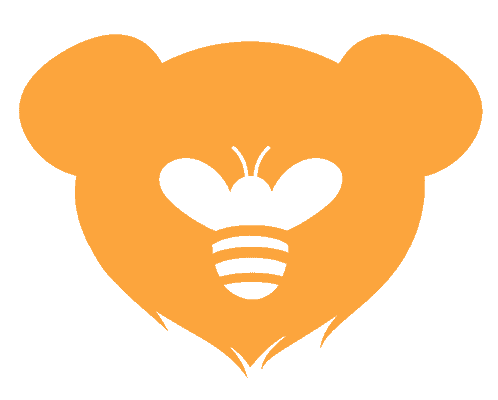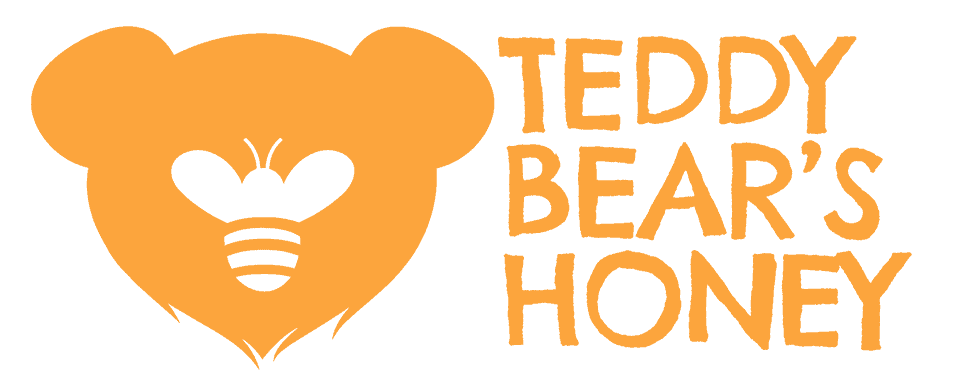You’ve heard of the health benefits of honey for people, but does honey offer the same benefits to cats? When thinking of some yummy treats to feed your feline friend, you may wonder if cats can have honey?
Honey isn’t toxic for cats. However, there aren’t any scientifically proven advantages to feeding honey to your cat. On the contrary, honey can cause digestive issues, weight gain, and insulin problems for a cat. Therefore, it isn’t recommended to feed your cat honey.
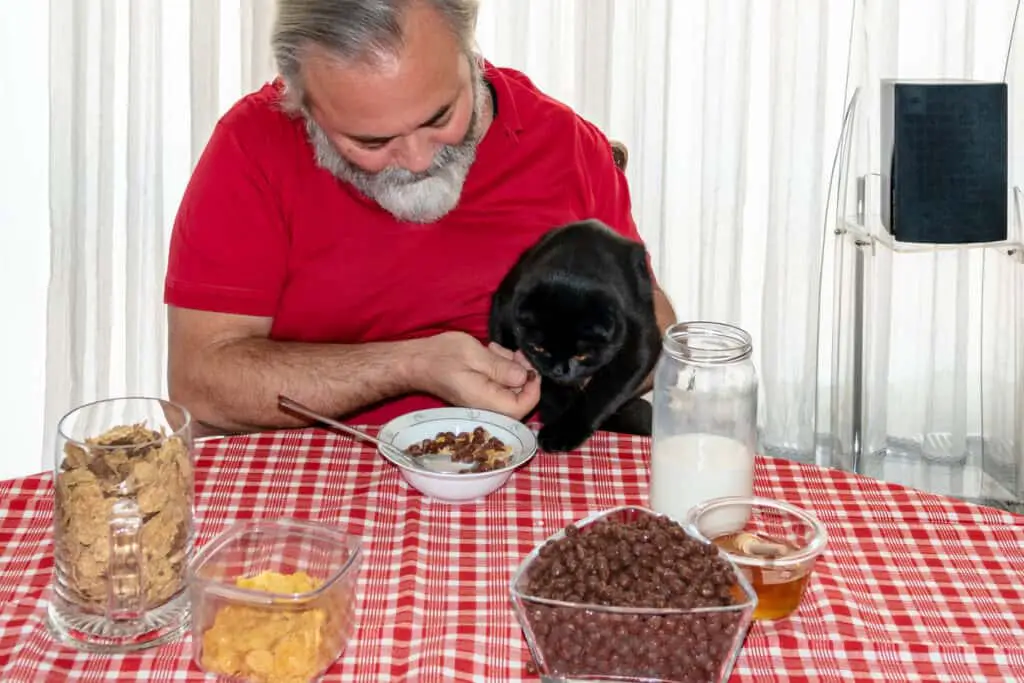
What are the possible health effects of honey for cats? We will discuss why you shouldn’t feed your cat honey, what to do if your cat eats honey, and better snack alternatives to feed your cat. To ensure your cat is healthy, vets generally don’t recommend feeding honey to cats, and we will discuss precisely why cats shouldn’t have honey.
Why Shouldn’t Cats Have Honey?
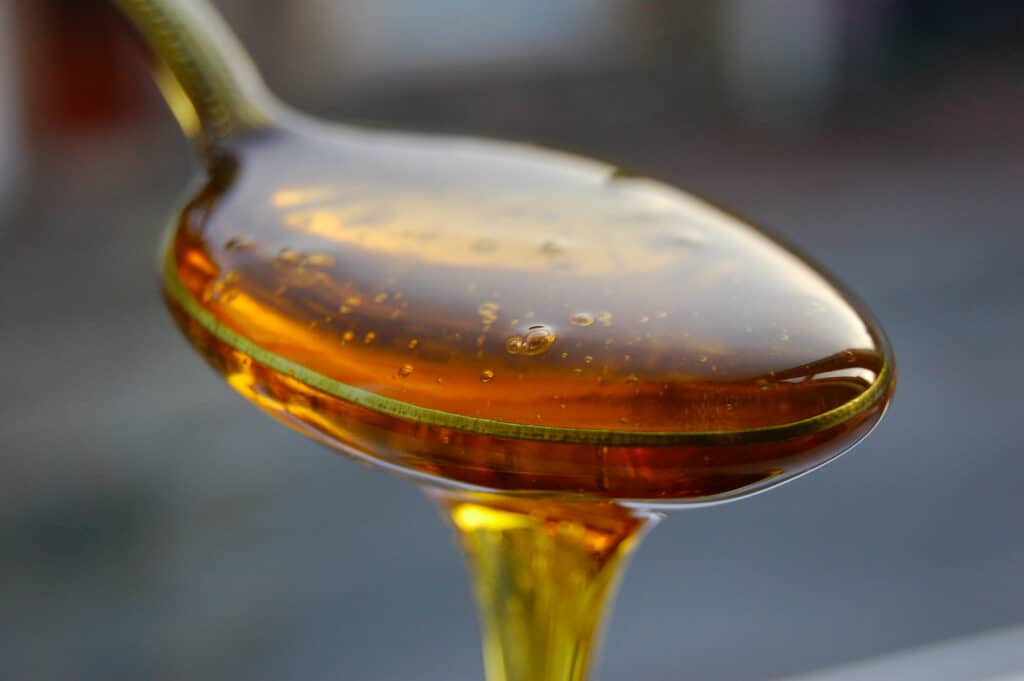
Honey isn’t toxic to cats, meaning that if your cat accidentally gets into your honey jar, it probably won’t die. However, this does not mean you should be feeding your cat honey regularly. Although honey has many health benefits for humans, the same is not true for cats.
Vets have several reasons for recommending you not to feed honey to your cat. Some of these reasons are just practical, while others indicate that honey can potentially harm your cat’s health. So, why shouldn’t you give your cat honey?
1. Cats Don’t Require Sugar In Their Diets
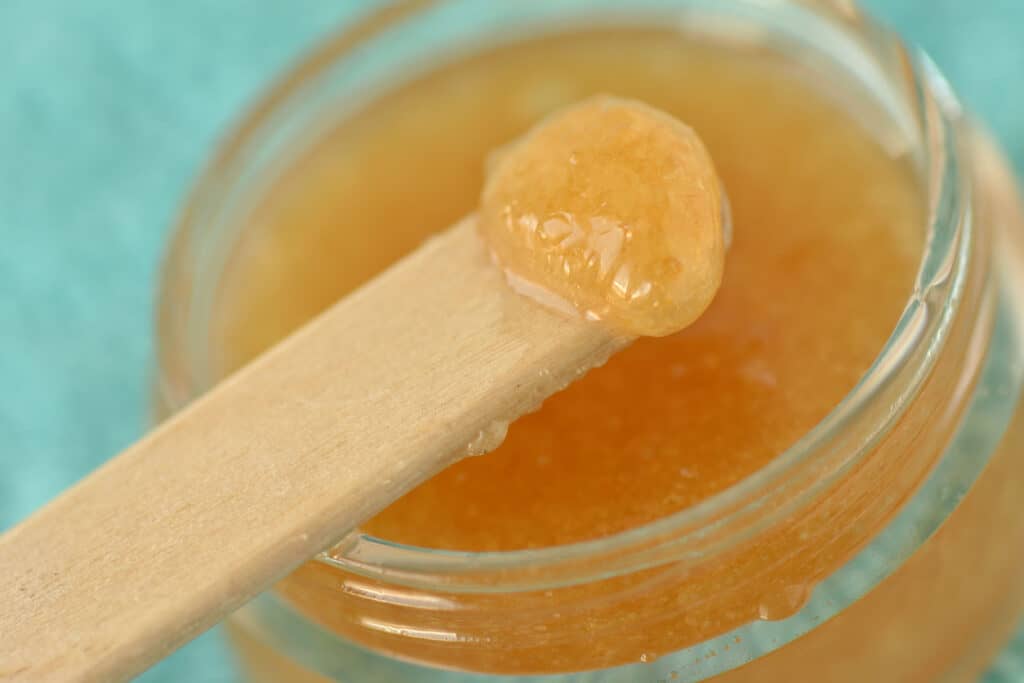
Cats, like other felines, are carnivores, meaning they only eat meat in the wild. This means their bodies and bodily functions are adapted to digesting and processing meat and meat products. Therefore, for a cat to be healthy, it needs a diet high in protein, fats, and minerals.
Cats require minimal carbs to maintain a healthy weight, and they don’t require any sugar at all. For example, honey is high in sucrose and glucose sugars, which are converted into carbs when consumed.
Therefore, it is safe to say that cats don’t require honey in their diets. They don’t need the carbs or sugars honey offers, and their bodies don’t quite know how to process these elements in the honey. For example, a cat’s liver doesn’t produce glucokinase which breaks down sugars and helps the body digest them. This means that a cat’s body cannot process honey like a human’s.
2. Honey Can Cause Digestive Problems For Cats
From the first point, you can already guess that honey might not agree with a cat’s stomach. Because they cannot process the sugars or carbohydrates in honey, cats often get stomach upsets from eating honey. Vomiting, diarrhea, and indigestion are common problems from eating honey.
While eating honey might cause a healthy cat some discomfort, stomach problems are a significant concern for sick cats. Unfortunately, many cat owners feed sick cats honey because they think honey benefits cats in the same way it does humans. This is not true, and when your ill cat starts vomiting, its condition can deteriorate rapidly.
Therefore, it’s not recommended to feed honey to a cat, whether it’s healthy or sick. Don’t feed your cat anything that can cause pain or discomfort, and you especially don’t want to worsen your cat’s condition if it’s ill.
3. Honey Is Especially Problematic For Kittens
Kittens are more susceptible to the possible health implications of honey. They have a smaller stomach, so half a teaspoon of honey can cause more problems for a kitten than an adult cat. In addition, kittens may have difficulty swallowing the honey due to its sticky nature.
A more significant concern with kittens eating honey is that their immune systems aren’t fully developed. Raw honey (the only honey you should keep in your home) contains bacteria and spores that can cause your kitten to become gravely ill.
Furthermore, the sugar in honey can cause your cat to develop dental problems and may lead to tooth decay. Therefore, never feed kittens honey as it can have detrimental health effects on your kitten. For this reason, you should also avoid giving honey to senior cats because their immune systems are not as strong. Therefore, they cannot fight bacterial infection as well as younger cats.
4. Honey Can Cause Weight Gain In Cats
Because cats don’t need sugars or carbohydrates in their diets, their bodies don’t know what to do with honey. Therefore, honey is often stored as fat in a cat’s body. Feeding your cat honey regularly may cause your cat to become overweight and even obese.
Obesity in cats can lead to all kinds of health problems, including diabetes. Therefore, you aren’t recommended to give your cat honey regularly, especially if it is already overweight. Many people give honey to underweight or malnourished cats in the hopes that it will increase their body weight.
However, while the honey will cause the cat to gain weight, the weight gained isn’t healthy and won’t advance your cat in the long term. Furthermore, some people give honey to diabetic cats to control their insulin levels. Unfortunately, honey can have the opposite effect and may worsen the cat’s condition.
5. Cats Cannot Taste honey
Many scientific studies propose that cats don’t have sweet taste receptors. This means that they cannot taste sweet things, such as honey. If your cat takes a lick of your ice cream or soda, it’s most likely out of curiosity rather than a craving for the taste.
Because cats cannot taste sweet things, they also cannot taste honey. While we don’t know what honey tastes like to a cat, we know it isn’t the sweet, delicious nectar it tastes like to humans. This further strengthens the point that there isn’t a reason to give your cat honey, as they don’t even enjoy the taste.
The honey jar is not the
place to look if you are looking for a nutritious and delicious snack to feed your cat. We will discuss some excellent kitten snacks later. While cats cannot taste sweet, they can taste meat, and therefore meat products make for a great treat.
6. Honey Can Cause Botulism Poisoning In Cats
The final reason you shouldn’t give your cat honey is that it can cause Botulism poisoning in your cat. Clostridium Botulinum is a bacteria found in certain raw meats, fermented vegetables, and honey. This bacterium can cause your cat to become seriously ill. In some cases, Botulism poisoning can even cause your cat’s diaphragm to become paralyzed, leading to feline death.
Although Botulism poisoning is rare, it can happen when cats eat honey, especially if they have compromised immune systems. Therefore, giving you cat honey regularly is never recommended, especially if it has a weakened immune system.
There are far better treats to feed a cat, and the potential health risks of honey far outweigh any possible health benefits. Research also suggests that honey offers no real health benefits, such as allergy relief and wound healing in cats. Hence there is no point in risking your cat’s well-being by feeding it honey.
What To Do When Your Cat Eats Honey
Let’s say your cat got curious and licked some honey from outside the honey jar. What should you do now? Your reaction to it eating honey mainly depends on your cat’s general health. If your cat is healthy and has no conditions, such as diabetes, it shouldn’t have a severe reaction from eating the honey.
However, if your feline is very young or old or has a compromised immune system, the honey might make it very sick. The best thing to do when discovering that your cat ate some honey is to monitor it very closely.
If your cat starts vomiting, has diarrhea, or becomes lethargic, take it to the veterinarian immediately. These are signs that your cat isn’t coping with the honey, and the honey’s bacteria might cause serious health problems.
However, if your cat appears slightly uncomfortable but shows no signs of severe illness, you don’t have to take it to a vet. In this case, continue monitoring your cat and note any changes in its behavior. In most cases, the cat shouldn’t have a severe reaction from eating a small amount of honey, and it will have an uncomfortable stomach at most.
Put the honey jar in a place where your cat cannot reach it, and also keep all other sweets and sugary foods out of reach from your cat, as they can have similar effects to honey.
Now that you know why cats cannot have honey and what to do if your cat accidentally eats honey, you might still have one question: “What treats can I feed my cat?”
Healthy Treats For Cats
Fortunately, there are many healthy treats you can give to your cat. Cats can eat various “human” foods. Always ensure the food is fresh and only feed your cat wholefoods for maximum nutritional value and benefits. Below are some great treats to give your cat. You can also experiment with these ingredients to make your cat balls, bars, and biscuits that they can enjoy.
Regardless of how healthy these foods are for your cat, it’s still important to control the number of calories your cat consumes daily. Housecats aren’t typically as active as wild cats, and if your cat is spayed or nurtured, it will be more prone to weight gain.
Therefore, feed your cat treats in moderation and ensure it is also fed a balanced diet of cat food. So, what healthy treats can you give your cat? Here is a list of cat-safe foods to give as a treat or snack.
Protein Treats For Cats
As you already know, cats are carnivores. Therefore, it’s safe to give them various protein sources. Salmon, tuna, eggs, turkey, and chicken are excellent protein sources for your cat. However, ensure there isn’t added salt and spices to the meat when serving it as a treat to your cat.
Eggs are high in vitamin B and protein, but you should only feed your cat cooked eggs. Furthermore, you can give your cat hard cheese as a treat. For example, try giving your cat Swiss cheese, Gouda or Cheddar and see if they like it. Cheese is also high in calcium, which benefits your cat.
Fruits To Give Cats
Although cats cannot have high-sugar foods, there are some fruits you can safely give your feline. Cantaloupe is high in antioxidants and beta-carotene, which is excellent for a cat’s eye health. Bananas are high in fiber and potassium but should be given in moderation to your cat.
Apples are high in vitamin C. You can feed your cat apples in moderation but be sure to remove the skin first. Blueberries are high in antioxidants and vitamins A and C. You can give your cat fresh or frozen blueberries but limit it to about ten blueberries per day.
Vegetables To Give Cats
In addition, you can also try several cat-friendly vegetables. For example, spinach is a superfood for humans and cats and contains many vitamins and minerals. However, if your cat has bladder stones, don’t give it spinach as a snack. Pumpkin is another great snack to feed your cat. It is high in fiber and can help regulate a cat’s stool.
Peas are also high in vitamins A and C and contain plenty of fiber that is great for your cat’s health. Many commercial cat food brands also contain peas; you can feed your cat a few peas daily for optimum health.
Other Beneficial Cat Treats
Other treats to consider giving your cat are fish oil tablets, oats, and bread. Limit the number of oats and bread you feed your cat as these foods contain a lot of carbohydrates. Don’t give your cat too many treats, and don’t introduce too many new foods into your cat’s diet at once.
When you know which treats your cat likes, you can experiment with different recipes and see how your cat reacts to each new treat it is presented with.
Conclusion
While honey isn’t toxic to cats, it also isn’t good for them. Honey can cause various health issues, such as digestive problems, tooth decay, and bacterial infections in cats. Therefore, it is recommended that you avoid giving your cat honey. Monitor your cat closely if it has eaten some honey, and take it to a vet if you notice any sickness symptoms.
Fortunately, there are many cat-safe foods you can use as a treat. Specific proteins, fruits, and vegetables can safely be given to your cat. Do so in moderation and monitor your cat’s health after introducing new food to its diet.
References
https://betterpet.com/can-cats-eat-honey/
https://blog.inspireuplift.com/can-cats-eat-honey/
https://www.buzzaboutbees.net/can-cats-taste-honey.html
https://www.catological.com/can-cats-eat-honey/ https://www.diynatural.com/can-dogs-eat-honey-cats/
